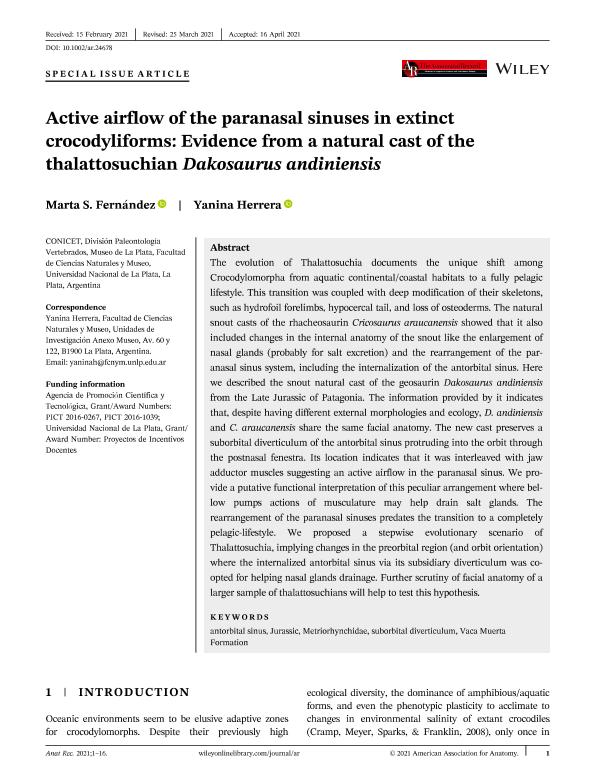Mostrar el registro sencillo del ítem
dc.contributor.author
Fernández, Marta S.

dc.contributor.author
Herrera, Laura Yanina

dc.date.available
2021-07-23T15:38:38Z
dc.date.issued
2021-06
dc.identifier.citation
Fernández, Marta S.; Herrera, Laura Yanina; Active airflow of the paranasal sinuses in extinct crocodyliforms: Evidence from a natural cast of the thalattosuchian Dakosaurus andiniensis; Wiley-liss, div John Wiley & Sons Inc.; Anatomical Record-Advances in Integrative Anatomy and Evolutionary Biology; 2021; 6-2021; 1-16
dc.identifier.issn
1932-8486
dc.identifier.uri
http://hdl.handle.net/11336/136755
dc.description.abstract
The evolution of Thalattosuchia documents the unique shift among Crocodylomorpha from aquatic continental/coastal habitats to a fully pelagic lifestyle. This transition was coupled with deep modification of their skeletons, such as hydrofoil forelimbs, hypocercal tail, and loss of osteoderms. The natural snout casts of the rhacheosaurin Cricosaurus araucanensis showed that it also included changes in the internal anatomy of the snout like the enlargement of nasal glands (probably for salt excretion) and the rearrangement of the paranasal sinus system, including the internalization of the antorbital sinus. Here we described the snout natural cast of the geosaurin Dakosaurus andiniensis from the Late Jurassic of Patagonia. The information provided by it indicates that, despite having different external morphologies and ecology, D. andiniensis and C. araucanensis share the same facial anatomy. The new cast preserves a suborbital diverticulum of the antorbital sinus protruding into the orbit through the postnasal fenestra. Its location indicates that it was interleaved with jaw adductor muscles suggesting an active airflow in the paranasal sinus. We provide a putative functional interpretation of this peculiar arrangement where bellow pumps actions of musculature may help drain salt glands. The rearrangement of the paranasal sinuses predates the transition to a completely pelagic-lifestyle. We proposed a stepwise evolutionary scenario of Thalattosuchia, implying changes in the preorbital region (and orbit orientation) where the internalized antorbital sinus via its subsidiary diverticulum was co-opted for helping nasal glands drainage. Further scrutiny of facial anatomy of a larger sample of thalattosuchians will help to test this hypothesis.
dc.format
application/pdf
dc.language.iso
eng
dc.publisher
Wiley-liss, div John Wiley & Sons Inc.

dc.rights
info:eu-repo/semantics/openAccess
dc.rights.uri
https://creativecommons.org/licenses/by-nc-sa/2.5/ar/
dc.subject
ANTORBITAL SINUS
dc.subject
JURASSIC
dc.subject
METRIORHYNCHIDAE
dc.subject
SUBORBITAL DIVERTICULUM
dc.subject
VACA MUERTA FORMATION
dc.subject.classification
Mineralogía

dc.subject.classification
Ciencias de la Tierra y relacionadas con el Medio Ambiente

dc.subject.classification
CIENCIAS NATURALES Y EXACTAS

dc.title
Active airflow of the paranasal sinuses in extinct crocodyliforms: Evidence from a natural cast of the thalattosuchian Dakosaurus andiniensis
dc.type
info:eu-repo/semantics/article
dc.type
info:ar-repo/semantics/artículo
dc.type
info:eu-repo/semantics/publishedVersion
dc.date.updated
2021-07-19T18:44:55Z
dc.journal.volume
2021
dc.journal.pagination
1-16
dc.journal.pais
Estados Unidos

dc.journal.ciudad
Hoboken
dc.description.fil
Fil: Fernández, Marta S.. Universidad Nacional de La Plata. Facultad de Ciencias Naturales y Museo. División Paleontología Vertebrados; Argentina
dc.description.fil
Fil: Herrera, Laura Yanina. Consejo Nacional de Investigaciones Científicas y Técnicas. Centro Científico Tecnológico Conicet - La Plata; Argentina. Universidad Nacional de La Plata. Facultad de Ciencias Naturales y Museo. División Paleontología Vertebrados; Argentina
dc.journal.title
Anatomical Record-Advances in Integrative Anatomy and Evolutionary Biology

dc.relation.alternativeid
info:eu-repo/semantics/altIdentifier/url/https://onlinelibrary.wiley.com/doi/10.1002/ar.24678
dc.relation.alternativeid
info:eu-repo/semantics/altIdentifier/doi/https://doi.org/10.1002/ar.24678
Archivos asociados
